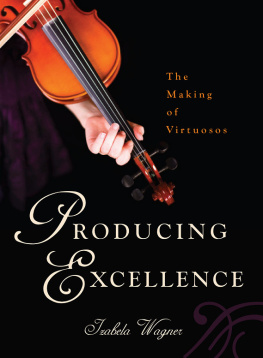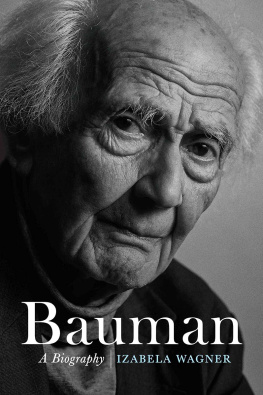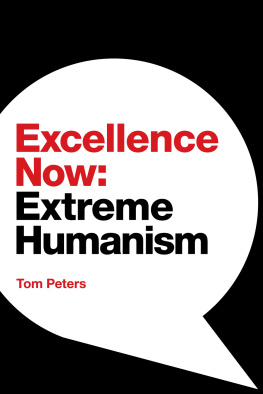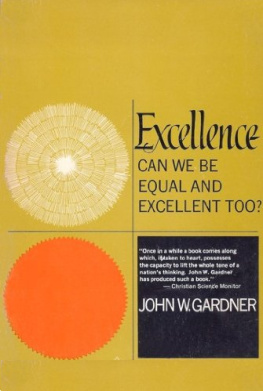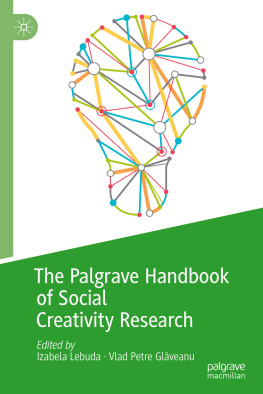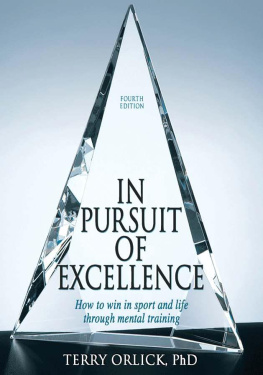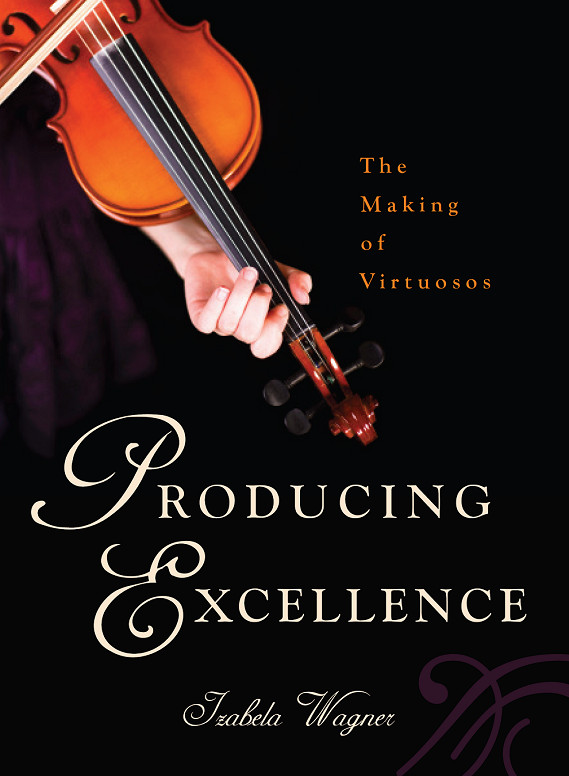Wagner, Izabela.
Producing excellence : the making of virtuosos / Izabela Wagner.
Includes bibliographical references and index.
ISBN 9780813570068 (hardcover : alk. paper) ISBN 9780813570051 (pbk. : alk. paper) ISBN 9780813570075 (e-book (web pdf)) ISBN 9780813575339 (e-book (epub))
1. ViolinInstruction and studySocial aspects. 2. MusicInstruction and studySocial aspects. 3. Virtuosity in musical performance. I. Title.
A British Cataloging-in-Publication record for this book is available from the British Library.
No part of this book may be reproduced or utilized in any form or by any means, electronic or mechanical, or by any information storage and retrieval system, without written permission from the publisher. Please contact Rutgers University Press, 106 Somerset Street, New Brunswick, NJ 08901. The only exception to this prohibition is fair use as defined by U.S. copyright law.
This book, like virtuoso playing, is the result of a sociological process; it is a collective work (like the art pieces analyzed by Howard S. Becker). Many people made this ethnographic study possible and helped me in the process of research and writing.
The book is based on participant observation, and as such requires thanks to all participants, who trusted me and spent many hours with me, discussing and confiding their hopes and fears. First, my sons contribution to this book should be mentioned. Without his involvement and patience, this book would not have been possible. Despite his youth, he is an exceptionally reflective and mature person; I am deeply grateful for the years we spent together on this project.
Some years after I started this study, my daughter began the violin and contributed as a second key informant to the observation process. Her sensitivity and spontaneous nature allowed me to explore this world from another perspective. I am deeply grateful for her help.
I am grateful to the dozen of young musicians who are close to our family. Knowing my sociological passion, they volunteered time and insight in the process of investigation and discussion. Living in our home sometimes for weeks or months, they shared with me their daily struggles, and I become a confidante and over time a specialist in their problems. I also wish to acknowledge all the adult participants who trusted me, despite the sensitive nature of the data. Without the time and attention of all these and other participants, this study could not have been carried out.
My work began as a PhD research project written in French under the supervision of Michel Chapoulie, a specialist of the Chicago school of sociology and a connoisseur of classical music, who was deeply involved in the process of analyzing the data. It was his idea to focus on violin virtuoso socialization. I would like to thank him not only for his supervision and for passionate discussions of sociology and music but for taking the risk of accepting me to the PhD group. I am also grateful for the amount of patience and the time he spent improving the French manuscript.
Before the PhD program, I had not done any writing in French. I was able to navigate this obstacle thanks to my husband, Philippe. His contribution to my study is incalculable. Philippes tolerance of the constant presence of research participants in our home (for over ten years); his listening to unfinished stories and his contributions to endless discussions about the musical world; his logistical help with the organization of our family life; and his financial support of my studyall of these constituted an indispensable base for my work. For taking on all these responsibilities, and foremost for his emotional and intellectual support, I will always be deeply grateful to my husband.
Considering the international character my findings, I felt it would be vital to provide an English version of this work. Several persons corrected parts of the early drafts of the book; in particular I would like to thank Herbert Scott for his help.
The science journalist and author Arthur Allen and I developed a fruitful and fascinating collaboration that turned into a scientific friendship. Arthur transformed the text, bringing to it his mastery of English. In exchange I helped his research in Polish archives and with translations of Polish interviews and articles for his work. Our work will always remain in my memory as a happy example of scientific collaboration.
I would like to acknowledge the support of two reviewers, Howard Becker, who inspired my research and gave me positive and encouraging feedback, and Paul DiMaggio for his involvement and a detailed review of my book. I am certain that his helpful remarks improved my work, making the text clearer and integrating it more effectively with a wider circle of sociological thinkers. I also wish to thank my editor at Rutgers University Press, Peter Mickulas, for his professional and tolerant help. Working with a foreign author who has never published in an American house is certainly an experience that requires special skills. I was lucky to have had Peters help. I was also lucky to benefit from the copyediting by a musician and professional editorDr. Helen Myers, who polished the text with deep field expertiseand Nicholas Humez, for indexing and proofreading.
Finally I wish to thank all the persons who read portions of the bookfriends, sociologists, and othersfor the time they spent reading the text and engaging in discussions about the work. Special thanks go to Josef Hermanowicz, Malgorzata Jacyno, Daniel Bizeul, Maciej Gdula, Adam Ostolski, and Sylwia Urbanska.
I wrote a book about the production of excellence, but this is also a book about passion. Passion for music, for violin, for perfection, for performance, for life. Thanks to all who contributed to the achievement of this book and to those who supported this passionate project and my passionate attitude toward my work.
PreludeScandal on the Stage
A European capital in the 1990s. A full concert hall in the closing hours of an international violin competition. Tonight, the finalists in the competition will each play a piece. Traditionally, the lowest-placed finisher takes the stage first, the grand-prize winner last. Tonight, the sixth-place finalist and the first to play is a sixteen-year-old Russian girl, Anastasia. Her selection is announced, a nineteenth-century piece for violin and piano. Anastasia, in a black evening gown, her violin in one hand, marches on stage with the confidence of her decade of experience as a soloist. Behind her is the competitions pianist, a woman of thirty, and the woman who will turn the pages of the score.
Anastasia takes her place at center stage, raises her violin to her shoulder, and nods for the A to be played in order to tune. Her accompanist gives the note; gradually the audience stops talking. The accompanist adjusts her bench, a ritual often done as the soloist tunes. Suddenly, with ardent passion and before the pianist can react, Anastasia attacks her violin with the first chord of a famous, expressive twentieth-century piece written for solo violin. The accompanist is shocked. Anastasia plays intently, as if possessed.

